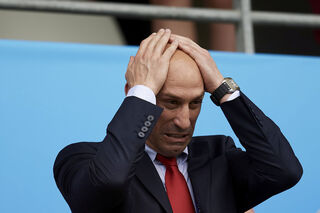Foto: imago/Jose Breton
Luis Rubiales has finally bowed to immense pressure and stepped down as the head of Spain’s football federation. This decision follows the scandal surrounding his inappropriate kiss with a female player after their Women’s World Cup victory, marking a pivotal moment in the fight against gender inequality.
After defiantly rejecting calls for his resignation for three weeks, Rubiales announced his departure in a television interview. He cited discussions with his family and friends as the reason behind this choice. Additionally, he relinquished his position as vice-president of UEFA, the European football governing body.
Kiss Controversy: Rubiales Bows to Pressure Amid Scandal
The incident unfolded following Spain’s historic Women’s World Cup win in Australia on August 20th. During the medal ceremony, Rubiales held Jennifer Hermoso and kissed her on the lips, asserting that the kiss was consensual. However, Hermoso vehemently disputed his account, labeling it “categorically false” and refuting any prior agreement. Immediately after the incident, during a live Instagram feed in the locker room, Spain’s top scorer openly expressed her discomfort, emphasizing that she “didn’t like it.” Subsequently, she challenged Rubiales’ narrative, describing herself as the victim of a “sexist impulse.”
Jennifer Hermoso’s Courageous Response: Championing Consent in Women’s Football
Moreover, during the game, Rubiales was captured making an offensive gesture while celebrating a goal near Spain’s Queen Letizia and one of her daughters.
Jennifer Hermoso filed a criminal complaint against Rubiales in Madrid on September 6th, and two days later, a Spanish prosecutor pressed charges against him.
Impact Beyond the Field: Rubiales’ Resignation and Legal Repercussions
This scandal has transcended the realm of sports, infiltrating Spain’s political landscape as the nation grapples with government formation after general elections on July 23rd. The caretaker administration, a coalition of Socialists and far-left groups, pledged to remove Rubiales. Victor Francos, Spain’s top sports official, likened this moment to a “Me Too” movement for football within the country.
Prime Minister Pedro Sanchez condemned Rubiales’ actions, emphasizing the pressing need for gender equality and respect. He labeled what transpired as “unacceptable.”
On August 25th, during a gathering of predominantly male Spanish football officials, Rubiales shocked attendees by firmly resisting calls for his resignation. He reiterated five times that he would not step down, earning applause from many present, including the fired female team’s coach, Jorge Vilda.
However, Rubiales’ attempts to discredit Hermoso ignited a wave of criticism, swaying public opinion against him. FIFA, the global governing body of football, suspended Rubiales for 90 days on August 26th, and the entire women’s squad refused to represent Spain as long as he remained in office. A caretaker president was appointed to replace him.
A global movement emerged in support of Hermoso and her teammates, with social media outrage coalescing around the phrase “se acabo,” signifying “it’s over.” This expression not only marked the end of Rubiales’ tenure but also underscored the broader condemnation of sexual harassment against women. In central Madrid, hundreds of people took to the streets, chanting “it’s not a peck, it’s aggression.” Spain, with its strict legislation on sexual consent outlined in the “Only Yes Means Yes” law, may witness ongoing legal consequences. Prosecutors recently filed charges against football chief Luis Rubiales for sexual assault and coercion related to the kiss he gave player Jennifer Hermoso last month while celebrating the country’s Women’s World Cup victory in Australia.





 English
English Deutsch
Deutsch Українська
Українська Polski
Polski עִבְרִית
עִבְרִית Türkçe
Türkçe العربية
العربية Français
Français Italiano
Italiano Español
Español 繁體中文
繁體中文 简体中文
简体中文 Shqip
Shqip Bosanski
Bosanski Български
Български Hrvatski
Hrvatski Čeština
Čeština Nederlands
Nederlands Suomi
Suomi Српски језик
Српски језик Ελληνικά
Ελληνικά Русский
Русский Română
Română Português
Português فارسی
فارسی ਪੰਜਾਬੀ
ਪੰਜਾਬੀ Svenska
Svenska Afrikaans
Afrikaans አማርኛ
አማርኛ Հայերեն
Հայերեն Azərbaycan dili
Azərbaycan dili Euskara
Euskara Беларуская мова
Беларуская мова বাংলা
বাংলা Català
Català Cebuano
Cebuano Chichewa
Chichewa Corsu
Corsu Dansk
Dansk Esperanto
Esperanto Eesti
Eesti Filipino
Filipino Frysk
Frysk Galego
Galego ქართული
ქართული ગુજરાતી
ગુજરાતી Kreyol ayisyen
Kreyol ayisyen Harshen Hausa
Harshen Hausa Ōlelo Hawaiʻi
Ōlelo Hawaiʻi हिन्दी
हिन्दी Hmong
Hmong Magyar
Magyar Íslenska
Íslenska Igbo
Igbo Bahasa Indonesia
Bahasa Indonesia Gaeilge
Gaeilge 日本語
日本語 Basa Jawa
Basa Jawa ಕನ್ನಡ
ಕನ್ನಡ Қазақ тілі
Қазақ тілі ភាសាខ្មែរ
ភាសាខ្មែរ 한국어
한국어 كوردی
كوردی Кыргызча
Кыргызча ພາສາລາວ
ພາສາລາວ Latin
Latin Latviešu valoda
Latviešu valoda Lietuvių kalba
Lietuvių kalba Lëtzebuergesch
Lëtzebuergesch Македонски јазик
Македонски јазик Malagasy
Malagasy Bahasa Melayu
Bahasa Melayu മലയാളം
മലയാളം Maltese
Maltese Te Reo Māori
Te Reo Māori मराठी
मराठी Монгол
Монгол ဗမာစာ
ဗမာစာ नेपाली
नेपाली Norsk bokmål
Norsk bokmål پښتو
پښتو Samoan
Samoan Gàidhlig
Gàidhlig Sesotho
Sesotho Shona
Shona سنڌي
سنڌي සිංහල
සිංහල Slovenčina
Slovenčina Slovenščina
Slovenščina Afsoomaali
Afsoomaali Basa Sunda
Basa Sunda Kiswahili
Kiswahili Тоҷикӣ
Тоҷикӣ தமிழ்
தமிழ் తెలుగు
తెలుగు ไทย
ไทย اردو
اردو O‘zbekcha
O‘zbekcha Tiếng Việt
Tiếng Việt Cymraeg
Cymraeg isiXhosa
isiXhosa יידיש
יידיש Yorùbá
Yorùbá Zulu
Zulu